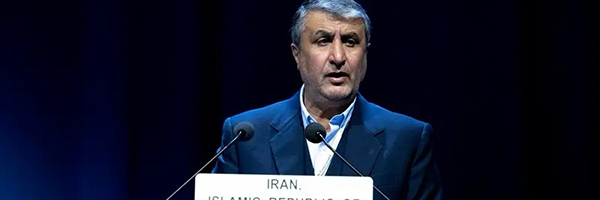 The Cradle, December 18, 2022 — Under the 2015 deal, Iran agreed to restrict its enrichment of uranium to just under four percent, below the 90 percent level considered necessary for a nuclear warhead.
The Cradle, December 18, 2022 — Under the 2015 deal, Iran agreed to restrict its enrichment of uranium to just under four percent, below the 90 percent level considered necessary for a nuclear warhead.
The head of the Atomic Energy Organization of Iran (AEOI), Mohamed Eslami, announced on 17 December that the country has managed to double its historical maximum uranium enrichment capacity, thanks to the facilities provided by the Iranian Parliament.
“Currently, the enrichment capacity of the country has reached more than twice the entire history of this industry,” Eslami said, according to the state news agency IRNA.
“Nuclear energy and atomic power production have great economic savings for the country and are effective in reducing fossil and non-renewable fuel consumption and environmental problems,” he added.
Eslami thanked the Iranian deputies for the so-called “strategic action” undertaken following international sanctions, restored after the United States’s unilateral exit from the international nuclear agreement with the Islamic republic, reported by Tasnim news agency.
In October, the head of the Iranian nuclear agency announced a plan to obtain 10,000 megawatts of nuclear electricity in Iran following the failure of the negotiations.
Meanwhile, a technical delegation from the Vienna-based International Atomic Energy Agency (IAEA) will travel to Iran on 18 December in an effort to break a deadlock regarding the discovery of radioactive material at locations that have not been acknowledged as the site of nuclear activity.
According to an exclusive report by Reuters released on 11 November, the US and the EU are pushing the IAEA to pass an “essential and urgent” resolution calling for Iran to explain uranium traces allegedly found at a number of undeclared Iranian nuclear sites.
The draft resolution, obtained by the news agency, was sent to the nuclear watchdog’s board of directors on 11 November. The previous day, Iran had agreed to a proposed meeting with the IAEA to discuss the allegations, the agency revealed in a 10 November report published by Reuters.
This most recent step was part of broader efforts to resuscitate the 2015 nuclear agreement between Tehran and Washington, which was scrapped by the Trump administration in 2018.
In September, Tehran and the IAEA restarted negotiations, centering mainly on the issue of the uranium traces. Iran has fired back at this allegation, referring to it as a fabrication by Israel, who it has previously accused of hijacking the IAEA.
